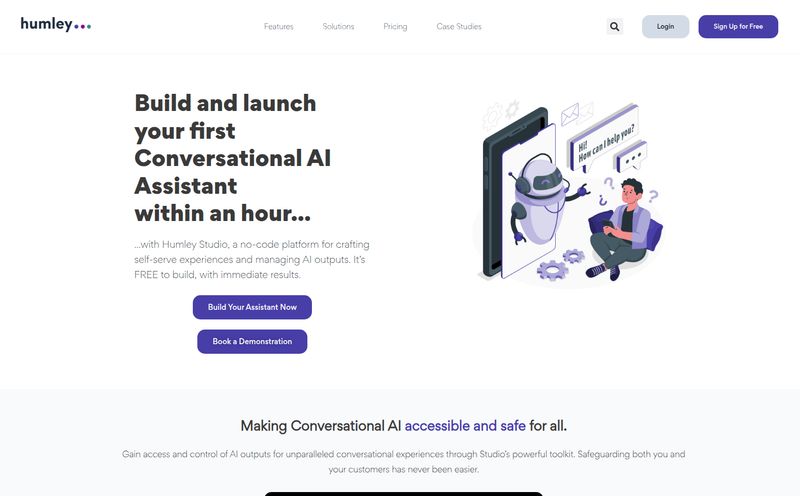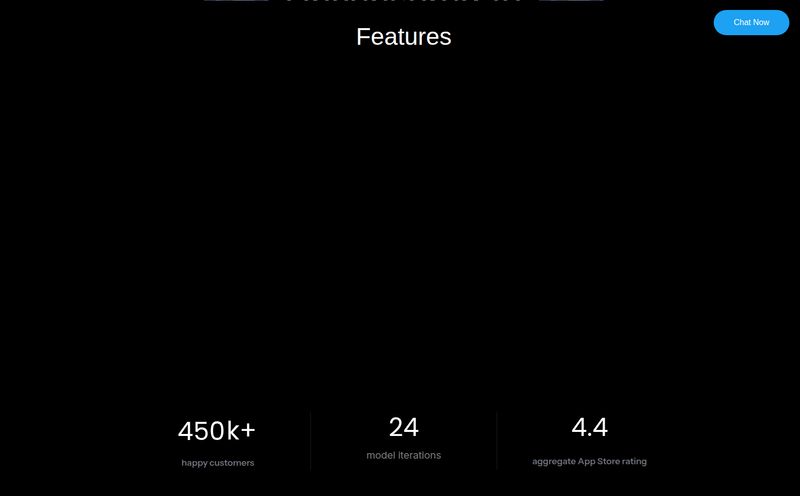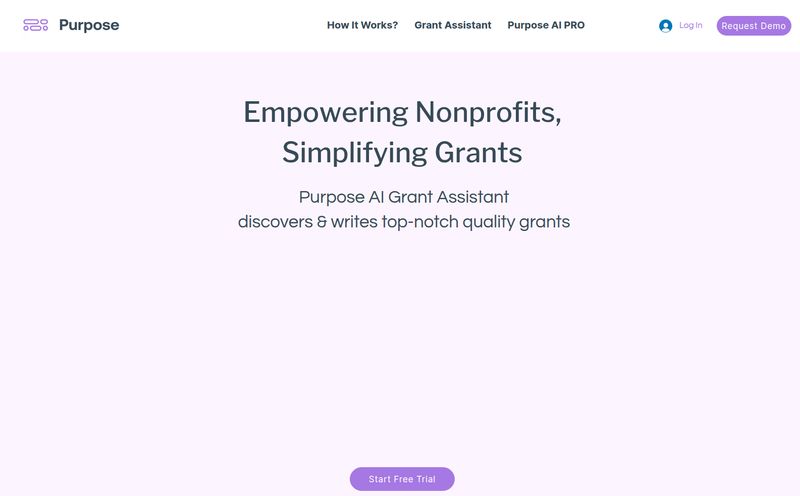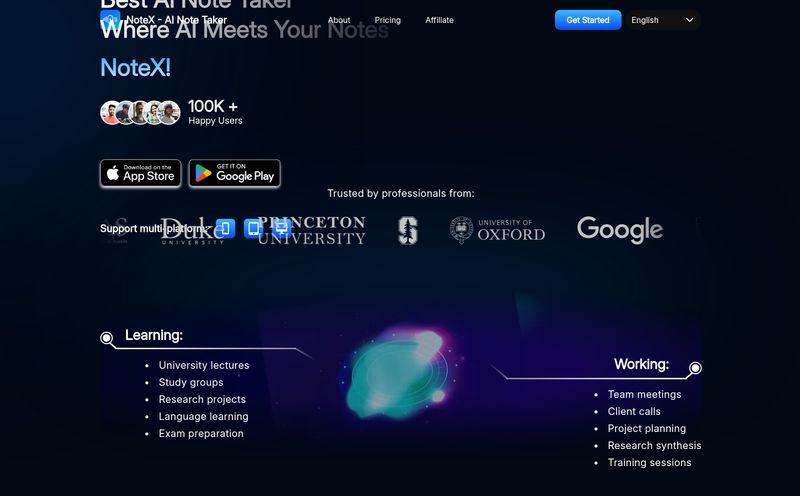As an SEO pro, I spend my days obsessing over user journeys, conversion funnels, and bounce rates. And one of the biggest, most frustrating culprits for a bad user experience? The on-site search bar. It’s often the digital equivalent of a cranky, unhelpful librarian who just points to a random shelf and mumbles. You know your users are looking for something specific, but your website’s search function is giving them… well, garbage.
It’s a massive leaky bucket. I've seen client sites with amazing content where the search results page had a 90% bounce rate. Ninety percent! All that hard work on content and traffic generation, flushed away because a user couldn't find what they wanted. So when I see a tool that claims to fix this—and not just fix it, but make it smart—my ears perk up. That’s what led me to ModernQuery, a platform that says, “on-site search is always bad,” and promises a real solution. A bold claim. Let’s see if they back it up.
Let's Be Real: Why Most On-Site Search Is Just Plain Awful
Before we get into the tool itself, we have to acknowledge the problem. The default search function on most platforms, especially the out-of-the-box WordPress search, is… rudimentary at best. It’s a relic from a simpler time. It looks for exact keyword matches and that’s about it. It doesn’t understand synonyms, context, or user intent. It has no idea that “running sneakers” and “shoes for jogging” are the same thing.
The result? Users get a page of irrelevant results or, even worse, the dreaded “No results found” page. And what do they do next? They hit the back button and go straight to Google to search for it, probably landing on your competitor’s site. Ouch. This isn’t just bad for UX; it’s a direct hit to your conversions, your authority, and your traffic stats. You’re basically inviting people to leave.
So, What Exactly is ModernQuery?
ModernQuery steps into this mess as a no-code, plug-and-play search solution. Think of it as a brain transplant for your website’s search bar. You’re not just getting a slightly better search algorithm; you’re dropping in a completely new, intelligent search system designed for how people actually search for things in 2024. It’s built to be a simple drop-in replacement that works on pretty much any website, whether you’re on WordPress, Drupal, or some custom-built platform, as long as you can add a snippet of JavaScript.
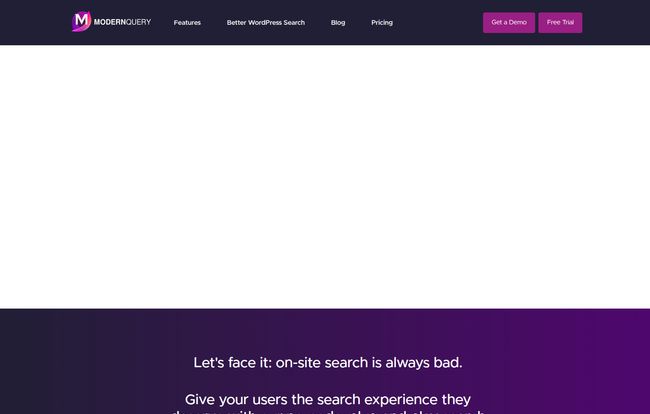
Visit ModernQuery
The whole “no-code” thing is the real winner for me here. You don’t need to be a developer or hire one to get this running. For so many small business owners and content creators, that’s the biggest hurdle to adopting new tech. ModernQuery seems to get that, offering plugins for the big CMS platforms to make it even simpler.
The Features That Actually Matter
A tool can have a million features, but only a few really move the needle. From my perspective, here’s what stands out with ModernQuery.
The Big One: ChatGPT Conversational Search
Okay, this is the headliner. We’re all used to AI now, but integrating it directly into site search is a game-changer. This isn’t just keyword matching anymore; it’s about understanding intent. A user can stop thinking like a robot and start asking questions like a human. Instead of typing “waterproof trail running shoes,” they can ask, “what are the best shoes for running on wet mountain trails?”
ModernQuery uses AI to understand the question and deliver a direct, conversational answer, along with the most relevant pages or products. It’s the difference between a search bar and a search assistant. For sites with huge knowledge bases, complex product catalogs, or tons of blog content, this one feature could dramatically improve how users find information.
Taking Back Control with Manual Ordering
Now this… this is something that gets the marketing side of my brain excited. As smart as AI is, sometimes you just know better. ModernQuery allows you to manually re-order search results. Why is this so powerful? Imagine you just launched a new flagship product. You can make sure it appears at the top of the results for dozens of relevant search terms. Have a high-converting article or a seasonal promotion? Pin it to the top. This gives you a level of control over the user journey that most on-site search tools completely lack. It’s a simple feature with profound implications for your bottom line.
Autocomplete and Search-as-You-Type
This should be standard everywhere, but it isn’t. We’re all spoiled by Google's instant suggestions. When a website doesn’t have it, the experience feels clunky and slow. ModernQuery includes that slick, search-as-you-type functionality with autocomplete suggestions. It guides the user, reduces typos, and helps them formulate their query faster. It’s a small touch that makes a huge difference in perceived quality and professionalism.
Let's Talk Money: The ModernQuery Pricing Breakdown
Alright, the all-important question: what’s this going to cost? The pricing structure is pretty straightforward, which I appreciate. No confusing credit systems or weird pricing models. They offer three main tiers, plus an enterprise option for the big players.
| Plan | Price | Key Features & Limits |
|---|---|---|
| Starter | $19 /mo | Up to 100 pages & 1,000 searches/mo. Includes manual ordering and search-as-you-type. |
| Business | $29 /mo | Up to 500 pages & 5,000 searches/mo. Adds PDF searching. |
| Scale | $49 /mo | Up to 2,000 pages & 10,000 searches/mo. Adds searching across multiple domains. |
Now, here’s the kicker. The ChatGPT Conversational Search is an add-on. It’s an extra $9.99/mo on the Starter plan and $12.99/mo on the Business and Scale plans. I'll admit, seeing the AI as an add-on gave me a slight pause. In a perfect world, it'd be baked in. However, I can see the logic. Not everyone needs or wants full conversational AI, and this à la carte model means you’re not forced to pay for the most resource-intensive feature if you don't need it. It’s a tradeoff, and something you absolutly need to factor into the total cost.
The Good, The Bad, and The Nitty-Gritty
No tool is perfect, right? After digging in, here's my honest breakdown.
The good stuff is obvious. It’s incredibly easy to implement for non-technical folks. The combination of AI-powered conversational search and the practical ability to manually override results is a potent one-two punch. It genuinely solves the core problem of terrible on-site search. And the 30-day free trial means you can see for yourself without any risk.
On the flip side, the main 'con' is the pricing model for the AI. Having the star feature as a paid add-on feels a little like buying a car and then paying extra for the engine. It's a fantastic engine, but you need to be aware of that extra cost. Also, gating features like PDF search and multi-domain search behind the higher-tier plans is pretty standard for SaaS, but still something to consider if those are must-haves for you on a tighter budget.
Who Is ModernQuery Really For?
So, who should seriously consider this? In my opinion, the list is pretty long.
- E-commerce Stores: Helping customers find the exact product they want is the fastest path to a sale. This is a no-brainer.
- Content-Heavy Blogs & Publishers: If you have years of articles, a good search is essential for keeping that old content alive and serving your readers.
- SaaS Companies: For documentation and knowledge bases, a conversational search could drastically reduce support tickets. Imagine users asking “how do I integrate with Zapier?” and getting an instant, helpful answer.
- Anyone Frustrated with Their Current Setup: Honestly, if you've ever typed a query into your own website’s search bar and cringed at the results, you’re the target audience.
My Final Verdict
Look, fixing on-site search isn't just a vanity project. It's a core part of conversion rate optimization and user experience. ModernQuery presents one of the most compelling, and accessible, solutions I’ve seen in a while. It's not the cheapest option on the market if you want all the bells and whistles, but it’s powerful, user-friendly, and directly addresses the biggest pain points of its predecessors.
It turns your search bar from a dumb, frustrating box into a smart, helpful assistant. And in a world where user patience is measured in seconds, that’s not just a nice upgrade; it’s a competitive advantage. Given the free trial, it’s definitely worth taking for a spin.
Frequently Asked Questions About ModernQuery
Is ModernQuery difficult to install on my website?
Not at all. It’s a no-code platform. For most websites, you just copy and paste a small snippet of JavaScript. If you're on WordPress or Drupal, they have dedicated plugins that make the process even easier, requiring just a few clicks.
Does the ChatGPT conversational search work on all plans?
The conversational search is available on all plans, but it is an optional paid add-on. The cost is $9.99/month for the Starter plan and $12.99/month for the Business and Scale plans. You can choose whether or not to include it.
What is the main benefit of manual search result ordering?
The biggest benefit is control. It allows you to strategically prioritize what your users see. You can push new products, highlight promotional content, or ensure your most popular and highest-converting pages always appear first for key terms, directly influencing user behavior and sales.
Can I try ModernQuery before I commit to a paid plan?
Yes, absolutely. ModernQuery offers a 30-day free trial with full features. This gives you plenty of time to integrate it with your site and see the impact it has on your user experience before you have to pay anything.
Is ModernQuery really that much better than the default WordPress search?
In my professional opinion, it’s not even a fair comparison. The default WordPress search is extremely basic. ModernQuery offers superior relevance, autocomplete, manual controls, and the option for advanced conversational AI. It’s like comparing a bicycle to a sports car—both will get you there, but one offers a vastly superior experience.
Reference and Sources
- ModernQuery Official Website
- ModernQuery Pricing Page
- Why You Need to Analyze Your Site Search Data - Moz
